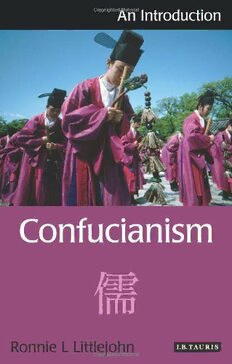Download Confucianism: An Introduction (I.B.Tauris Introductions to Religion) PDF Free - Full Version
Download Confucianism: An Introduction (I.B.Tauris Introductions to Religion) by Ronnie Littlejohn in PDF format completely FREE. No registration required, no payment needed. Get instant access to this valuable resource on PDFdrive.to!
About Confucianism: An Introduction (I.B.Tauris Introductions to Religion)
It is arguably Confucianism, not Communism, which lies at the core of China's deepest sense of self. Although reviled by Chinese intellectuals of the 1950s-1990s, who spoke of it as "yellow silt clotting the arteries of the country," Confucianism has defied eradication, remaining a fundamental part of the nation's soul for 2500 years. And now, as China assumes greater ascendancy on the world economic stage, it is making a strong comeback as a pragmatic philosophy of personal as well as corporate transformation, popular in both home and boardroom. What is this complex system of ideology that stems from the teachings of a remarkable man called Confucius (Kongzi), who lived in the distant sixth century BCE? Though he left no writings of his own, the oral teachings recorded by the founder's disciples in the Analects left a profound mark on later Chinese politics and governance. They outline a system of social cohesiveness dependent upon personal virtue and self-control. For Confucius, society's harmony relied upon the appropriate behaviour of each individual within the social hierarchy; and its emphasis on practical ethics has led many to think of Confucianism as a secular philosophy rather than a religion. In this new, comprehensive introduction, Ronnie Littlejohn argues rather that Confucianism is profoundly spiritual, and must be treated as such. He offers full coverage of the tradition's sometimes neglected metaphysics, as well as its varied manifestations in education, art, literature and culture.
Detailed Information
| Author: | Ronnie Littlejohn |
|---|---|
| Publication Year: | 2010 |
| ISBN: | 9781848851733 |
| Pages: | 257 |
| Language: | English |
| File Size: | 3.44 |
| Format: | |
| Price: | FREE |
Safe & Secure Download - No registration required
Why Choose PDFdrive for Your Free Confucianism: An Introduction (I.B.Tauris Introductions to Religion) Download?
- 100% Free: No hidden fees or subscriptions required for one book every day.
- No Registration: Immediate access is available without creating accounts for one book every day.
- Safe and Secure: Clean downloads without malware or viruses
- Multiple Formats: PDF, MOBI, Mpub,... optimized for all devices
- Educational Resource: Supporting knowledge sharing and learning
Frequently Asked Questions
Is it really free to download Confucianism: An Introduction (I.B.Tauris Introductions to Religion) PDF?
Yes, on https://PDFdrive.to you can download Confucianism: An Introduction (I.B.Tauris Introductions to Religion) by Ronnie Littlejohn completely free. We don't require any payment, subscription, or registration to access this PDF file. For 3 books every day.
How can I read Confucianism: An Introduction (I.B.Tauris Introductions to Religion) on my mobile device?
After downloading Confucianism: An Introduction (I.B.Tauris Introductions to Religion) PDF, you can open it with any PDF reader app on your phone or tablet. We recommend using Adobe Acrobat Reader, Apple Books, or Google Play Books for the best reading experience.
Is this the full version of Confucianism: An Introduction (I.B.Tauris Introductions to Religion)?
Yes, this is the complete PDF version of Confucianism: An Introduction (I.B.Tauris Introductions to Religion) by Ronnie Littlejohn. You will be able to read the entire content as in the printed version without missing any pages.
Is it legal to download Confucianism: An Introduction (I.B.Tauris Introductions to Religion) PDF for free?
https://PDFdrive.to provides links to free educational resources available online. We do not store any files on our servers. Please be aware of copyright laws in your country before downloading.
The materials shared are intended for research, educational, and personal use in accordance with fair use principles.

